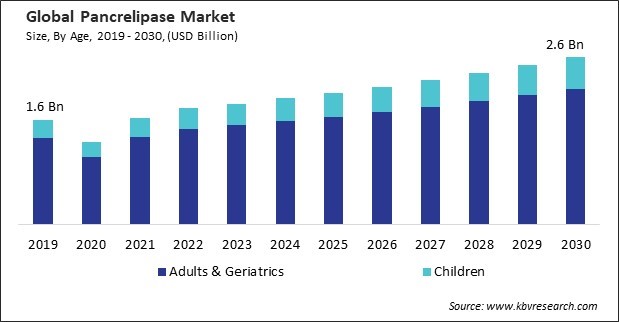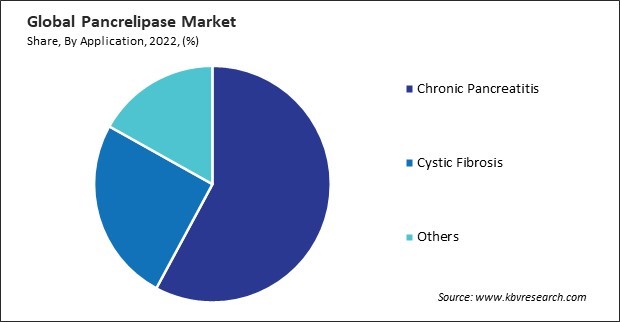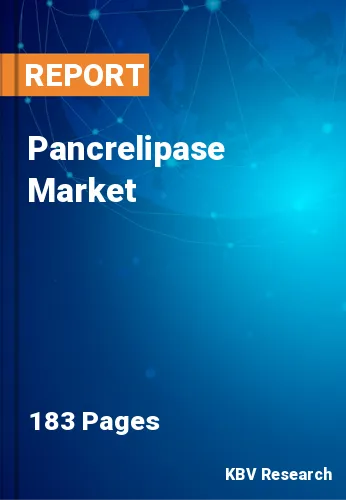“Global Pancrelipase Market to reach a market value of USD 2.6 Billion by 2030 growing at a CAGR of 4.7%”
The Global Pancrelipase Market size is expected to reach $2.6 billion by 2030, rising at a market growth of 4.7% CAGR during the forecast period.
Collaborations between pharmaceutical companies, research institutions, and healthcare organizations on an international scale may foster innovation in medicine’s development and distribution in the Asia Pacific. Consequently, the Asia Pacific region would acquire nearly 20% of the total market share by 2030. Growing awareness and emphasis on digestive health contribute to recognizing the importance of managing conditions like pancreatic insufficiency. This awareness can drive both patient's and healthcare providers' demand for the medicine.

Advances in molecular biology and genetic profiling contribute to the emergence of personalized medicine. Tailoring treatment plans based on personal patient characteristics enhances the efficacy of therapy, leading to better outcomes. Data analytics and AI-driven technologies aid in analyzing large datasets, identifying patterns, and predicting disease progression. These tools can assist healthcare professionals in making more informed decisions regarding medicinal dosage adjustments and treatment plans. As a result, the ongoing technological advancements are expected to expand market growth. Additionally, a natural decline in pancreatic function often accompanies aging. This decline may result in reduced secretion of digestive enzymes, leading to conditions such as pancreatic insufficiency. Medicine becomes essential to support digestion in these individuals. Older adults may be more prone to medication-induced pancreatitis, a condition where certain medications can lead to inflammation of the pancreas. This medicine is utilized in the management of pancreatitis, irrespective of its cause. Due to the growing proportion of the aging population, the market is expected to grow significantly.
However, High treatment costs can limit access to this medicine for patients, specifically those without adequate insurance coverage or high out-of-pocket expenses. This restriction in access can lead to suboptimal management of pancreatic disorders. Healthcare providers and systems may face challenges in allocating resources to cover the costs of this medicine, especially when managing a large patient population with pancreatic disorders. Due to the above factors, market growth will be hampered in the coming years.
Moreover, the market experienced disruptions in manufacturing processes due to lockdowns, restrictions, and workforce limitations imposed to curb the spread of the virus. These challenges led to temporary production facility closures, affecting the supply of formulations. Remote monitoring of patients on therapy faced challenges, as healthcare providers had to navigate limitations in assessing treatment effectiveness without physical examinations and laboratory tests. As a result, COVID-19 had a moderate impact on the market.
By distribution channel, the market is classified into online pharmacies, hospital pharmacies, and drug store & retail pharmacies. The online pharmacies segment recorded a remarkable revenue share in the market in 2022. Regulations about the sale and distribution of prescription medications vary between countries. Some online pharmacies operate within stringent regulatory frameworks and adhere to established standards, while others may have looser regulations. Online pharmacies may offer various formulations and dosages of this medicine. Patients should ensure they purchase the specific formulation and dosage their healthcare provider prescribes.
Based on application, the market is fragmented into chronic pancreatitis, cystic fibrosis, and others. The cystic fibrosis segment garnered a significant revenue share in the market in 2022. Cystic fibrosis often leads to pancreatic insufficiency, where the pancreas produces insufficient digestive enzymes. This medicine is prescribed to compensate for this deficiency, ensuring proper digestion and absorption of nutrients from food. The medicine is a key component in the nutritional management of individuals with cystic fibrosis. It helps prevent malnutrition by supporting the breakdown of nutrients, allowing for better absorption in the digestive system.

On the basis of age, the market is segmented into children and adults & geriatrics. The children's segment acquired a substantial revenue share in the pancreatic market in 2022. Children with cystic fibrosis often require this medicine to compensate for the reduced pancreatic enzyme production. This medicine helps them digest and absorb essential nutrients from food. Children who undergo pancreatic surgery or experience trauma to the pancreas may have reduced enzyme secretion. Some children may have congenital conditions, such as pancreatic agenesis or malformations, resulting in insufficient enzyme production. The medicine addresses enzyme deficiency and facilitates proper digestion in these cases.
Free Valuable Insights: Global Pancrelipase Market size to reach USD 2.6 Billion by 2030
Region-wise, the market is analysed across North America, Europe, Asia Pacific, and LAMEA. In 2022, the North America region witnessed the largest revenue share in the market. Increased awareness among healthcare professionals and patients regarding managing pancreatic insufficiency can drive the demand for this medicine. Education initiatives can lead to early diagnosis and timely initiation of appropriate treatment. Focus on patient-centric approaches, including personalized medicine, can drive the demand for this medicine. Tailoring therapy plans based on individual patient profiles and genetic factors can optimize therapy and improve patient outcomes.
| Report Attribute | Details |
|---|---|
| Market size value in 2022 | USD 1.8 Billion |
| Market size forecast in 2030 | USD 2.6 Billion |
| Base Year | 2022 |
| Historical Period | 2019 to 2021 |
| Forecast Period | 2023 to 2030 |
| Revenue Growth Rate | CAGR of 4.7% from 2023 to 2030 |
| Number of Pages | 183 |
| Number of Tables | 337 |
| Report coverage | Market Trends, Revenue Estimation and Forecast, Segmentation Analysis, Regional and Country Breakdown, Porter’s 5 Forces Analysis, Company Profiling, Companies Strategic Developments, SWOT Analysis, Winning Imperatives |
| Segments covered | Age, Distribution Channel, Application, Region |
| Country scope |
|
| Companies Included | Organon & Co., Digestive Care, Inc., AbbVie, Inc., Vivus LLC, Laboratorio Opoterápico Argentino S.A., Nestle S.A and Scientific Protein Laboratories, LLC (Hepalink) |
By Age
By Distribution Channel
By Application
By Geography
This Market size is expected to reach $2.6 billion by 2030.
Technological innovations in healthcare are driving the Market in coming years, however, High cost of enzyme replacement therapy restraints the growth of the Market.
Organon & Co., Digestive Care, Inc., AbbVie, Inc., Vivus LLC, Laboratorio Opoterápico Argentino S.A., Nestle S.A and Scientific Protein Laboratories, LLC (Hepalink)
The expected CAGR of this Market is 4.7% from 2023 to 2030.
The Drug Store & Retail Pharmacies segment led the Market by Distribution Channel in 2022; there by, achieving a market value of $1.4 Billion by 2030.
The North America region dominated the Market by Region in 2022, and would continue to be a dominant market till 2030; there by, achieving a market value of $1.3 Billion by 2030.
Our team of dedicated experts can provide you with attractive expansion opportunities for your business.

 Drivers
Drivers
 Restraints
Restraints
 Opportunities
Opportunities
 Challenges
Challenges
